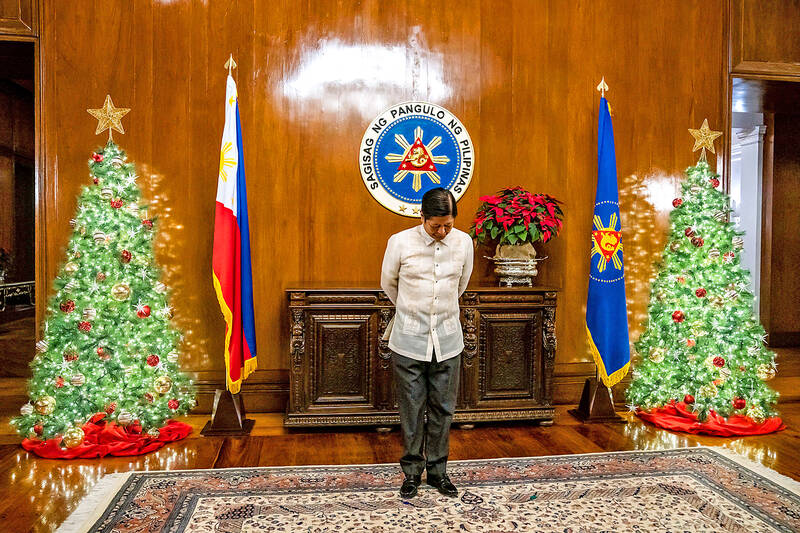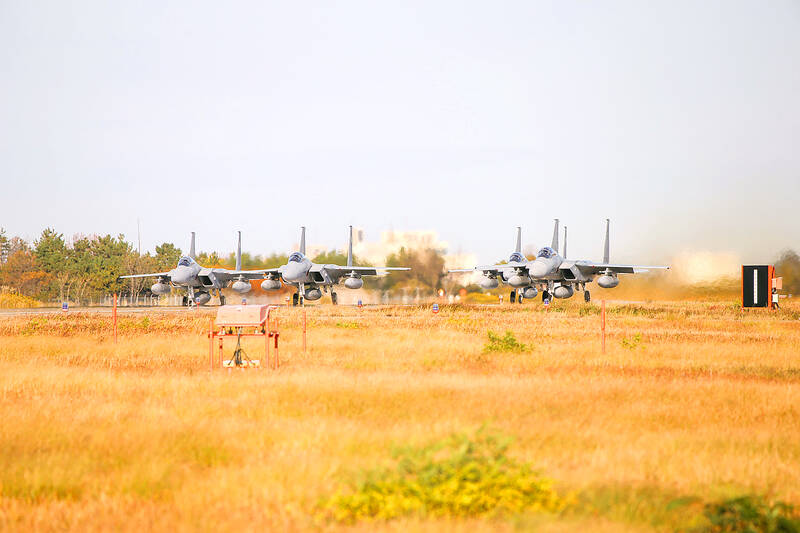Philippine President Ferdinand Marcos Jr yesterday arrived in Japan for a visit that is expected to pave the way for closer security ties with Tokyo, as Manila increasingly sides with the US in its regional tussle with China.
Marcos and Japanese Prime Minister Fumio Kishida are expected to deepen cooperation in humanitarian assistance and disaster relief, a possible precursor to establishing a broader legal framework that would allow Japanese forces to deploy to the Philippines more easily.
“As the United States deepens its relationship with the Philippines, it’s important for regional security that Japan join in,” a Japanese Ministry of Defense source with knowledge of internal discussions on national security said.

Photo: AFP
He asked not to be identified because he is not authorized to talk to the media.
Marcos’ first visit to Japan since taking office in July last year comes after he last week signed an agreement granting the US greater access to its military bases in the Philippines.
It also follows a trip to Beijing last month during which he told Chinese President Xi Jinping (習近平) that the Philippines would pursue an independent foreign policy.

Photo: AFP / Japan`s Ministry of Defense
“My bilateral visit to Japan is essential,” Marcos said in a speech as he departed Manila. “It is part of a larger foreign policy agenda to forge closer political ties, stronger defense and security cooperation, as well as lasting economic partnerships with major countries in the region amid a challenging global environment.”
Marcos said he would build collaboration on priority areas such as agriculture, renewable energy, digital transformation, infrastructure, and defense and security.
That sentiment is shared in Tokyo, which has been deepening security ties with nations that view China with concern.
A year ago, Japan and Australia signed a visiting forces agreement, allowing them to deploy forces on each other’s soil, and Tokyo concluded a similar accord with the UK last month.
Those deals provide a framework for how Marcos and Kishida could also forge deeper military ties to counter a common adversary, experts say.
“The Philippines is a critical security partner for Japan,” said Narushige Michishita, a professor at the National Graduate Institute for Policy Studies in Tokyo. “Any conflict in the Taiwan Strait would make the Philippine Sea strategically important.”
Taiwan has become a focal point of intensifying Chinese military activity that Tokyo and Washington worry could escalate into war.
A Japanese military presence in the Philippines could also help Marcos counter Chinese influence in the South China Sea, much of which Beijing claims, including territory that Manila considers its own.
Beijing has said its intentions in the region are peaceful.
Marcos has vowed not lose an inch of territory in the strategic waterway, through which US$3 trillion in ship-borne trade passes annually.
By gaining access to bases in the Philippines, Japan would extend the range of its defense forces, including surveillance aircraft that could patrol the South China Sea, Ken Jinbo, a professor at Keio University in Tokyo who also served as a security adviser to the Japanese government.
“One thing people are watching out for during President Marcos’ visit is whether Japan will agree to provide infrastructure assistance now that the United States has access to the nine bases there,” he said.

POLITICAL PRISONERS VS DEPORTEES: Venezuela’s prosecutor’s office slammed the call by El Salvador’s leader, accusing him of crimes against humanity Salvadoran President Nayib Bukele on Sunday proposed carrying out a prisoner swap with Venezuela, suggesting he would exchange Venezuelan deportees from the US his government has kept imprisoned for what he called “political prisoners” in Venezuela. In a post on X, directed at Venezuelan President Nicolas Maduro, Bukele listed off a number of family members of high-level opposition figures in Venezuela, journalists and activists detained during the South American government’s electoral crackdown last year. “The only reason they are imprisoned is for having opposed you and your electoral fraud,” he wrote to Maduro. “However, I want to propose a humanitarian agreement that

ECONOMIC WORRIES: The ruling PAP faces voters amid concerns that the city-state faces the possibility of a recession and job losses amid Washington’s tariffs Singapore yesterday finalized contestants for its general election on Saturday next week, with the ruling People’s Action Party (PAP) fielding 32 new candidates in the biggest refresh of the party that has ruled the city-state since independence in 1965. The move follows a pledge by Singaporean Prime Minister Lawrence Wong (黃循財), who took office last year and assumed the PAP leadership, to “bring in new blood, new ideas and new energy” to steer the country of 6 million people. His latest shake-up beats that of predecessors Lee Hsien Loong (李顯龍) and Goh Chok Tong (吳作棟), who replaced 24 and 11 politicians respectively

Young women standing idly around a park in Tokyo’s west suggest that a giant statue of Godzilla is not the only attraction for a record number of foreign tourists. Their faces lit by the cold glow of their phones, the women lining Okubo Park are evidence that sex tourism has developed as a dark flipside to the bustling Kabukicho nightlife district. Increasing numbers of foreign men are flocking to the area after seeing videos on social media. One of the women said that the area near Kabukicho, where Godzilla rumbles and belches smoke atop a cinema, has become a “real

‘POINT OF NO RETURN’: The Caribbean nation needs increased international funding and support for a multinational force to help police tackle expanding gang violence The top UN official in Haiti on Monday sounded an alarm to the UN Security Council that escalating gang violence is liable to lead the Caribbean nation to “a point of no return.” Special Representative of the UN Secretary-General for Haiti Maria Isabel Salvador said that “Haiti could face total chaos” without increased funding and support for the operation of the Kenya-led multinational force helping Haiti’s police to tackle the gangs’ expanding violence into areas beyond the capital, Port-Au-Prince. Most recently, gangs seized the city of Mirebalais in central Haiti, and during the attack more than 500 prisoners were freed, she said.